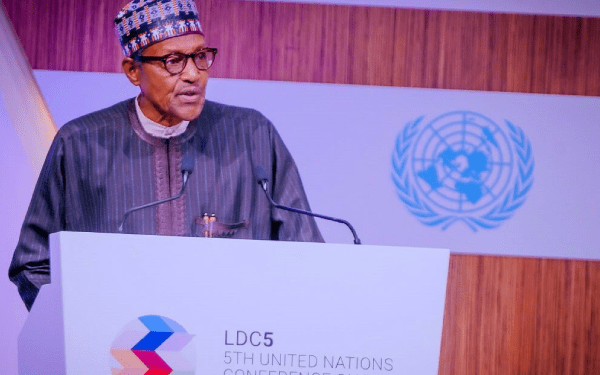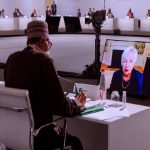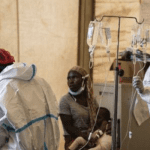President Muhammadu Buhari has urged developed and developing countries to allow products from the world’s 46 least-developed countries duty-free and quota-free market access.
He explained that this is to ensure their inclusion in regional and global value chains.
The President’s spokesman, Malam Garba Shehu, said Buhari made the call at the United Nations Conference of Least Developed Countries in Doha, Qatar.
He insisted that in order to assure their integration into local and international value chains, it had become essential.
The president sharply criticized the framework of the current international financial system, which lays an unsupportable foreign debt burden on the most vulnerable nations in the globe.
He cautioned that high debt loads would make it extremely difficult for LDCs to achieve the Seventeen Sustainable Development Goals of the 2030 Agenda.
‘‘In 2015, the world came together to endorse the 2030 Agenda for Seventeen Sustainable Development Goals.
”There was no doubt that it was highly ambitious and would require leaders around the world to be fully committed for the SDGs to be achieved within the projected timeframe.
‘‘Eight years on, the possibility of achieving the SDGs remains bleak for many countries, particularly, the Least Developed Countries.
”The difficulties in achieving the SDGs are numerous and were further compounded by the COVID-19 pandemic, the continued threat of Climate Change, and recently the Russia-Ukraine conflict.

‘‘The Least Developed Countries are often faced with developmental vulnerabilities and challenges that are not always of their making.
”These pose huge obstacles to their development efforts, hence the need for urgent and robust assistance to help unlock their potentials and build socio-economic resilience.”
This assistance, he believes, can be provided within the framework of the Doha Programme of Action, which is intended to help LDCs exit their current classification.
The Nigerian leader challenged developed countries, civil society actors, the private sector, and the business community to work with LDCs to provide the resources and capacity needed to deliver on the 2030 Agenda’s economic, social, and environmental goals.
He listed some measures that would help LDCs recover from COVID-19, achieve SDGs, and develop and prosper over the long term.
‘‘As a matter of urgency, there are a number of priorities we have to focus on to help achieve the SDGs in these countries and ensure their prosperity.
”First, COVID-19 has taught us that we must all work together, to ensure that diseases do not thrive in the LDCs, due to their overall negative impact on productivity and economic growth and development.
‘‘Accordingly, policy and budgetary provisions must be made to ensure equal access to medicare and vaccines, for both the poor and the rich alike.














